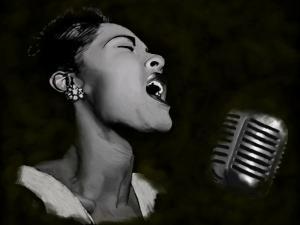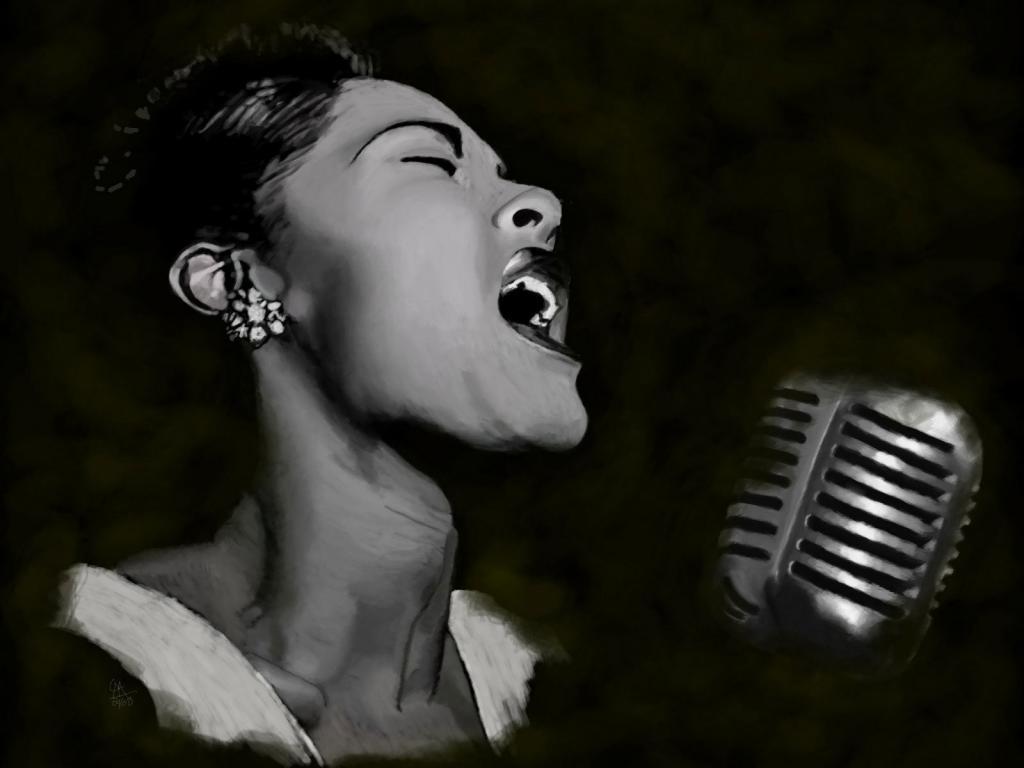
Fifty four years ago today, one of the most powerful, influential vocalists of the modern era, Billie Holiday, passed away in a New York City infirmary, surrounded by law enforcement after a drug raid on her hospital room only hours before. Though the seminal singer’s life was often plagued with abuse, racism, drugs and pain, the magic of her music and stunning vocals helped to define the landscape of Jazz and Blues, and became a benchmark of popular music for decades to come.
Born to a very young, single teenage mother, Holiday’s childhood was, by any measure, incredibly difficult. A child with an often absent, working mother, frequently moving homes and enduring, even as a child, the racism of the time, Billie was forced to grow up quickly. It was during her childhood, however, that she first discovered Jazz, which would move her to grow into one of the most powerful, magnificent singers in American history.
In Lady Sings the Blues, the acclaimed 1956 autobiography from the singer, (which was later made into a movie starring Diana Ross), Holiday talks about running various errands at no charge for the madam of a whorehouse, just so she could buy time listening to Louis Armstrong and Bessie Smith on an old victrola record player. “If I’d heard Pops and Bessie wailing through the window of some minister’s front parlor, I’d have been running free errands for him,” she proudly proclaimed. She also talks about her brutal rape at ten years old by a man in his forties, and being abused by the police and churned through a catholic probation system as a result of simply being a victim. As a teenager, she worked several odd jobs, worked as a call girl, and found herself in the court system several times, once ending in a prison stint. A desperate, late-night winter audition, however, proved to be the defining moment that would start the young Holiday on a path to stardom.
With her mother sick and bed-bound, rent overdue, and the threat of eviction the next morning, Billie raced through the snow, coatless, begging club owners for only a chance to dance — hoping to scare up just enough money to get by. Instead, she was told to sing. By the end of the night, she left with $57 (nearly $900 in today’s value, adjusting for inflation) and a weekly job as a singer.
Her reputation quickly grew and she made several records for Columbia and Vocalion, two of the biggest labels of the time. She was employed to play the Apollo Theater, and was eventually signed by famed producer John Hammond to Brunswick Records. She toured with Count Bassie and later, as the only black member of an all-white band with Artie Shaw, a progressive and uncommon feat, though an experience marred with racism on tour.
Holiday’s star continued to gain attention, playing a regular show at a club in New York City, and recording tracks that continued to climb up the Jazz and, eventually, Pop charts. As the singer began earning significant money, she was introduced to Heroin by a boyfriend. The addiction to the drug would become a lifelong fight. She met her earliest and primary influence, Louis Armstrong, and soon the two were to star in a movie, New Orleans, though racism in film lead to the cutting of most of the two’s scenes. “You can be up to your boobies in white satin,” She wrote of the Jim Crow plague in Lady Sings, “with gardenias in your hair and no sugar cain for miles, but you can still be working on a plantation.”
Soon after the movie’s release, Holiday’s home was again raided, she was arrested for drug possession, and sent to prison. Her influence while inside apparently didn’t fade — a testament to her lasting impact, and upon her release, she made a comeback concert at Carnegie Hall, selling out the prestigious venue and drawing great praise from critics and fans. Though her comeback was a striking success, the sales of her albums slowed, and the effects of drugs & heavy drinking began to show. Soon, a career-wounding blow would lose Billie the vast majority of her performing ability.
In the mid-century, performers in New York City were forced to carry Cabaret Cards, issued by the NYC police department, in order to play most legitimate (high paying) venues. The cards could be revoked for artists doing things that showed “poor character”. The card system was largely a political farce, with cards sometimes being pulled strictly for politics, race, sometimes drugs, profanity, etc. As a result of her recent drug conviction(s), Billie joined the ranks of Charlie Parker and Thelonious Monk in having her Cabaret Card revoked, and she was largely barred from playing any legitimate clubs in NYC. With poor album sales and the exclusion of high-paying venues, the singer was forced into working smaller venues for lower wages. Meanwhile, her drug abuse worsened and her relationships, which by her own admission were often rocky, were fraught with abuse and trouble. Her voice had showed signs of wear and she had fallen into poor health.
In the mid-1950s, her autobiography, Lady Sings the Blues was released, with an accompanying album. The telling book was written in a first-person style that shared the tough-girl tone of Billie’s personality. In it, she left no stone unturned as she talked about her painful upbringing, rape, prison, prostitution, abusive relationships, drug abuse, hard jobs hustling for nickels, and, soon, her stunning and powerful singing career that brought her accolades, money, fame, and an influential presence — a success story from a small girl who survived and overcame horrible circumstances to become a celebrated & well-paid musical figure in a time when all cards were stacked against a hard working african american woman. She again played a celebrated show at Carnegie Hall and even had a short run starring in a Broadway musical.
Sadly, during the swell in popularity, the singer was still struggling against personal demons. Holiday was trapped in a tumultuous relationship while continuing to heavily abuse drugs and alcohol. Her manager had mishandled song rights, past labels were not paying back royalties, and coupled with a crippling drug addiction, she was rapidly running out of money. The long-term substance abuse damaged her heart and liver. She was diagnosed with liver cirrhosis, and within months, became terminally ill. After being checked into the hospital in a weakened state, police raided her hospital room, and kept the singer under armed guard, even as she lay dying — a move that has often been decried as a deeply racist atrocity.
Though the stunning singer passed away virtually penniless, surrounded by the hatred of the law, she had already bestowed her towering musical gift upon the world — singing, in her golden, emotionally rich voice, songs of loss, life, love, and humanity. Her voice and her music, despite the best efforts against her, couldn’t be stifled. Countless singers were influenced by her incredible emotion and vocal intuition, and Frank Sinatra went so far as to call her his greatest influence. Six of her songs and four of her albums were posthumously inducted into the Grammy Hall of Fame, and 28 years after her death, she was given a Grammy Lifetime Achievement. A 1972 movie, with Diana Ross playing Billie, was made about her life. In 2000, she was inducted into the Rock and Roll Hall of Fame, along with Nat King Cole, as a key Early Influence. Though it has been 54 years since her death, her legacy continues to impact music and culture.


